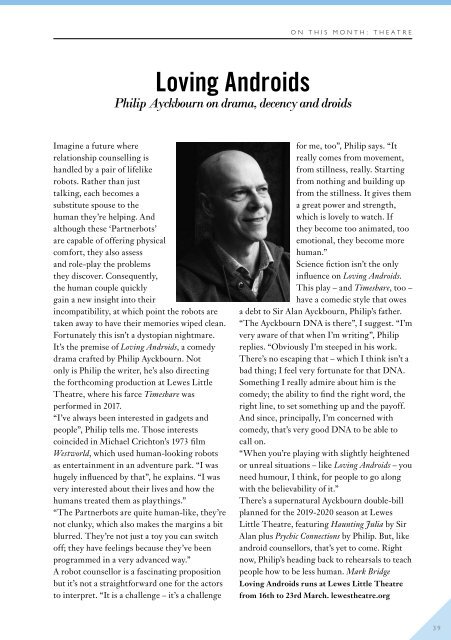Viva Lewes Issue #150 March 2019
You also want an ePaper? Increase the reach of your titles
YUMPU automatically turns print PDFs into web optimized ePapers that Google loves.
ON THIS MONTH: THEATRE<br />
Loving Androids<br />
Philip Ayckbourn on drama, decency and droids<br />
Imagine a future where<br />
relationship counselling is<br />
handled by a pair of lifelike<br />
robots. Rather than just<br />
talking, each becomes a<br />
substitute spouse to the<br />
human they’re helping. And<br />
although these ‘Partnerbots’<br />
are capable of offering physical<br />
comfort, they also assess<br />
and role-play the problems<br />
they discover. Consequently,<br />
the human couple quickly<br />
gain a new insight into their<br />
incompatibility, at which point the robots are<br />
taken away to have their memories wiped clean.<br />
Fortunately this isn’t a dystopian nightmare.<br />
It’s the premise of Loving Androids, a comedy<br />
drama crafted by Philip Ayckbourn. Not<br />
only is Philip the writer, he’s also directing<br />
the forthcoming production at <strong>Lewes</strong> Little<br />
Theatre, where his farce Timeshare was<br />
performed in 2017.<br />
“I’ve always been interested in gadgets and<br />
people”, Philip tells me. Those interests<br />
coincided in Michael Crichton’s 1973 film<br />
Westworld, which used human-looking robots<br />
as entertainment in an adventure park. “I was<br />
hugely influenced by that”, he explains. “I was<br />
very interested about their lives and how the<br />
humans treated them as playthings.”<br />
“The Partnerbots are quite human-like, they’re<br />
not clunky, which also makes the margins a bit<br />
blurred. They’re not just a toy you can switch<br />
off; they have feelings because they’ve been<br />
programmed in a very advanced way.”<br />
A robot counsellor is a fascinating proposition<br />
but it’s not a straightforward one for the actors<br />
to interpret. “It is a challenge – it’s a challenge<br />
for me, too”, Philip says. “It<br />
really comes from movement,<br />
from stillness, really. Starting<br />
from nothing and building up<br />
from the stillness. It gives them<br />
a great power and strength,<br />
which is lovely to watch. If<br />
they become too animated, too<br />
emotional, they become more<br />
human.”<br />
Science fiction isn’t the only<br />
influence on Loving Androids.<br />
This play – and Timeshare, too –<br />
have a comedic style that owes<br />
a debt to Sir Alan Ayckbourn, Philip’s father.<br />
“The Ayckbourn DNA is there”, I suggest. “I’m<br />
very aware of that when I’m writing”, Philip<br />
replies. “Obviously I’m steeped in his work.<br />
There’s no escaping that – which I think isn’t a<br />
bad thing; I feel very fortunate for that DNA.<br />
Something I really admire about him is the<br />
comedy; the ability to find the right word, the<br />
right line, to set something up and the payoff.<br />
And since, principally, I’m concerned with<br />
comedy, that’s very good DNA to be able to<br />
call on.<br />
“When you’re playing with slightly heightened<br />
or unreal situations – like Loving Androids – you<br />
need humour, I think, for people to go along<br />
with the believability of it.”<br />
There’s a supernatural Ayckbourn double-bill<br />
planned for the <strong>2019</strong>-2020 season at <strong>Lewes</strong><br />
Little Theatre, featuring Haunting Julia by Sir<br />
Alan plus Psychic Connections by Philip. But, like<br />
android counsellors, that’s yet to come. Right<br />
now, Philip’s heading back to rehearsals to teach<br />
people how to be less human. Mark Bridge<br />
Loving Androids runs at <strong>Lewes</strong> Little Theatre<br />
from 16th to 23rd <strong>March</strong>. lewestheatre.org<br />
39


















